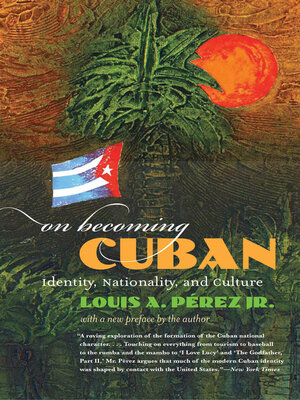On Becoming Cuban
ebook ∣ Identity, Nationality, and Culture · H. Eugene and Lillian Youngs Lehman Series
By Louis A. Pérez Jr.

Sign up to save your library
With an OverDrive account, you can save your favorite libraries for at-a-glance information about availability. Find out more about OverDrive accounts.
Find this title in Libby, the library reading app by OverDrive.



Search for a digital library with this title
Title found at these libraries:
| Library Name | Distance |
|---|---|
| Loading... |
With this masterful work, Louis A. Pérez Jr. transforms the way we view Cuba and its relationship with the United States. On Becoming Cuban is a sweeping cultural history of the sustained encounter between the peoples of the two countries and of the ways that this encounter helped shape Cubans' identity, nationality, and sense of modernity from the early 1850s until the revolution of 1959.
Using an enormous range of Cuban and U.S. sources — from archival records and oral interviews to popular magazines, novels, and motion pictures — Pérez reveals a powerful web of everyday, bilateral connections between the United States and Cuba and shows how U.S. cultural forms had a critical influence on the development of Cubans' sense of themselves as a people and as a nation. He also articulates the cultural context for the revolution that erupted in Cuba in 1959. In the middle of the twentieth century, Pérez argues, when economic hard times and political crises combined to make Cubans painfully aware that their American-influenced expectations of prosperity and modernity would not be realized, the stage was set for revolution.
Using an enormous range of Cuban and U.S. sources — from archival records and oral interviews to popular magazines, novels, and motion pictures — Pérez reveals a powerful web of everyday, bilateral connections between the United States and Cuba and shows how U.S. cultural forms had a critical influence on the development of Cubans' sense of themselves as a people and as a nation. He also articulates the cultural context for the revolution that erupted in Cuba in 1959. In the middle of the twentieth century, Pérez argues, when economic hard times and political crises combined to make Cubans painfully aware that their American-influenced expectations of prosperity and modernity would not be realized, the stage was set for revolution.







